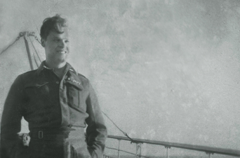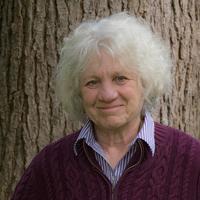
One placard said: "Welcome Home. What home? Where?"
On the evening of January 5, 1946, ex-serviceman Bob McEwen was camped out on the Vancouver Courthouse lawn with three of his mates to protest the acute shortage of housing for veterans trying to resume life after the Second World War. To emphasize their point, the men had pitched a tent and lit a bonfire.
They had more signs. Another read: "People say: 'My you fellows were lucky to come through all that.' Were we?"
The story of those returning vets who protested the scarcity and high price of housing in Vancouver more than a half century ago resonates this Remembrance Day weekend, as activists grow more militant in pushing government to preserve SRO hotels and provide shelters. Their tactic of invading and occupying empty buildings to get politicians' attention is nothing new. Just ask Bob McEwen.
Sleeping in an oven
McEwen is 83 years old and living in San Pedro, California. Reached by phone, he told The Tyee that in 1946 in Vancouver, "There was no place to live. There were expensive hotels, but we were just getting out of the army with no money. We couldn't very well do that."
For lack of anything better, after coming back, McEwen had moved into his father's two-room apartment. He slept on a couch in the kitchen with his head in the gas oven and his feet in the sink. But he wasn't going to put up with that for much longer. McEwen had married while he was in England. He was expecting his bride to join him soon and he needed a decent place for her to live.
Specifically, Bob McEwen wanted the old Vancouver Hotel turned into housing. The building at the corner of Georgia and Granville was unoccupied at the time. It had been used by the army as a recruiting centre during the war; now it was a warehouse for blankets and mattresses. The idea of turning it into a hostel for veterans had already been floated by a variety of groups in 1944, but no one could decide on who would refurbish the old building and manage it. It was a good idea, but it was going nowhere.
Towards 10 p.m. on the evening of Jan. 5, 1946, the bonfire McEwen had lit began sputtering out. When the provincial police ordered him to douse the flame, he complied, folded up the tent and stole away. But he wasn't about to give up.
'We chased the Germans'
McEwen, a big man weighing 220 pounds and standing well over six feet tall, was not easily intimidated. He had been in the army since 1940 after enlisting, illegally, at the age of 16 when he couldn't find any work. "Things were tough," he said. "They were signing up soldiers at the Seaforth Armouries so I marched in there.
"The sergeant at the desk said, 'How old are you and where were you born?'
"I said, 'I'm 16, I was born in Los Angeles.'
"He said, 'Get out of here and come back tomorrow when you are born in Edmonton and are 21.' That's what I did. The next day when he asked, 'How old are you?' I said, 'Twenty-one.' When he asked, 'Where were you born?' I said, 'Edmonton.' He said, 'Get in that line over there." McEwen had joined the Seaforth Highlanders.
McEwen fought with his unit through Sicily, and landed in Reggio di Calabria, in the toe of Italy's boot. Later, when the Princess Louise Dragoon Guards from Ottawa, a motorized unit, needed someone with mechanical experience, he was transferred. "We were a commando company. We chased the Germans. When the infantry would lose them, they'd tell us to go find them and hold them until they got there. So that's what we did."
McEwen was wounded in 1944 and after recuperating in Foggia, was transferred yet again -- to the Lanark and Renfrew Scottish Regiment. "They needed me to fix vehicles. They attached me to a mortar platoon with Bren gun carriers in trucks. We went through Italy, France, Belgium, Holland and into Germany."
Seizing a landmark
Back in Vancouver and without a home, McEwen discovered the bonfire protest did little to move his agenda forward. Days went by. The city, the federal authorities and the CPR who owned the Vancouver Hotel were locked into endless negotiations. The housing crisis was no closer to any kind of resolution.
Then, on Jan. 26, McEwen decided to take matters into his own hands.
It was a snowy Saturday afternoon, and McEwen was attending a meeting at the Legion Hall, then on Seymour Street just off Georgia. He said, "Let's go and march into that old Vancouver Hotel and get some attention." The 35 ex-soldiers at the meeting agreed to do it and McEwen led the parade. "When we came to the soldier at the gate, we told him what we were going to do. 'We're going to take over. Get out of the way.' He did."
The victorious veterans hung up a 15-foot by 3-foot banner outside, reading, "Action at Last Veterans! Rooms for you. Come and Get them." By evening, the hotel's Spanish Grill and Ballroom was thumping. The vets had organized a dance and that night more than 100 of them bunked down in the hotel.
The public was overwhelmingly on the side of the protesters. The Eden Café, two blocks away, supplied more than 150 complete meals. The lobby was stacked with pails of donated ham and cheese sandwiches. Coffee, mugs, spoons and sugar were all provided by local merchants. On Sunday, 700 men "registered" for rooms. Various local officials -- George Derby, the regional director of the department of veteran's affairs, Vancouver Mayor J. W. Cornett and James Sinclair, the MP from North Vancouver (and the father of Margaret Trudeau) dropped by.
The Vancouver Sun reported Sinclair saying, "You did right. You waited until all negotiations had failed, then you took the bull by the horns and moved in." By Monday morning, the federal government was involved. The minister for veterans affairs, Ian Mackenzie, arrived by train on a fact-finding mission.
Fond memories
Bob McEwen's action had somehow broken the logjam. The hotel was a hostel. It was a fait accompli. No one felt like telling 700 angry vets to leave. On Tuesday, Mackenzie announced that the federal government would pay $70,000 and the city would contribute $24,000 towards running the hostel. A rehabilitation council, which had already been formed to help returning soldiers, agreed to operate it.
Veterans who stayed in the Vancouver Hotel have fond memories of the place. Bob Dunn who lived there for about four months said in a phone interview, "It was great. The bathtub was seven feet long. And there was a place across the street called The Fish and Oyster Bar -- best fish and chips in the country."
Jean Hubbard spent nine months in the hotel with her husband, Tom, who was studying at UBC. "We were not supposed to cook in our rooms, but Tom had noticed an electrical wire outside our room that was linked to a separate circuit and we hooked into it."
Hubbard learned how to cook chocolate cakes in her pressure cooker and delicious odours frequently filled her room and wafted down the hall.
Ron Grenon who is now 81 said, "It was quite a good deal; we paid about $20 a month and they even supplied the linen. Nobody was over 40, mostly in their 20s and 30s. It was fun."
But, of course, the hostel wasn't a long-term solution. In 1947, the city council and the federal Department of Reconstruction and Supply finally agreed to provide permanent rental housing for the vets. Later many of them moved to a new subdivision of 600 units known as Renfrew Heights, which was created out of that agreement. Bob McEwen didn't move to Renfrew Heights, but he said, "I received a home at Venables and East Hastings. We lived there for a few years until we could afford something better."
Dismantling a memory
Finally declared unsafe, the old hotel was torn down in April 1948. Jean Hubbard said, "I was working at Birks when they took the old hotel down. I was in tears. It was special to people who lived there."
By an odd coincidence, Bob McEwen was in the trucking business when the hotel was demolished. "I got the contract from the Cleveland Wrecking Company to haul all the debris away. I didn't make any money. I just about went broke. When I got down to the last two or three floors, they gave me granite blocks that barely fit on a big dump truck. I couldn't get rid of them. The Bayshore Inn sits on part of the old Vancouver Hotel. We dumped some there, off the pier. The drive-in theatre in New Westminster, off the Lougheed Highway was built out of the debris. We took some to the Mohawk Handle Company on the Fraser River."
Bob McEwen got what he wanted. But he's not at all sure that protestors these days will have the same success.
"They allowed us a little leeway to do things like take over the old Vancouver Hotel," McEwen says of officials back then. "I think you'd be slapped in jail pretty quick if you did that today."
Related Tyee stories:
- Homeless Activists Scoring Points
- Welfare's New Era: Survival of the Fittest
- The Myth of Dense Vancouver















Tyee Commenting Guidelines
Comments that violate guidelines risk being deleted, and violations may result in a temporary or permanent user ban. Maintain the spirit of good conversation to stay in the discussion.
*Please note The Tyee is not a forum for spreading misinformation about COVID-19, denying its existence or minimizing its risk to public health.
Do:
Do not: